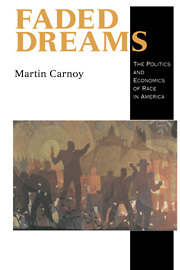Book contents
- Frontmatter
- Contents
- Preface
- 1 Introduction
- 2 The ups and downs of African-American fortunes
- 3 The politics of explaining racial inequality
- 4 Are blacks to blame?
- 5 Is the economy to blame?
- 6 Have racism and discrimination increased?
- 7 Politics and black educational opportunity
- 8 Politics and black job opportunities: I
- 9 Politics and black job opportunities: II
- 10 Black economic gains and ideology: the White House factor
- 11 Is there any hope for greater equality?
- Appendix A
- Appendix B
- Notes
- Index
9 - Politics and black job opportunities: II
Published online by Cambridge University Press: 06 October 2009
- Frontmatter
- Contents
- Preface
- 1 Introduction
- 2 The ups and downs of African-American fortunes
- 3 The politics of explaining racial inequality
- 4 Are blacks to blame?
- 5 Is the economy to blame?
- 6 Have racism and discrimination increased?
- 7 Politics and black educational opportunity
- 8 Politics and black job opportunities: I
- 9 Politics and black job opportunities: II
- 10 Black economic gains and ideology: the White House factor
- 11 Is there any hope for greater equality?
- Appendix A
- Appendix B
- Notes
- Index
Summary
Politics has influenced labor market conditions for minorities directly through mandated affirmative action in private labor markets. The single biggest drop (about half of the total) in black wage discrimination occurred between 1959 and 1973, and it came about both from federal legislative action in the early 1960s and from a Supreme Court that gave the legislation broad interpretation. This was the result of direct federal intervention in schools and labor markets. All of the evidence suggests that it had a lasting effect on the market's definition of equity.
What role does law play in wage discrimination in capitalist markets? How do laws change, and what is their subsequent impact on minority wages? The relation between political-legal action and markets is not obvious. More traditional defenders of markets as efficient resource allocators claim that political interference in labor markets – such as affirmative action – has only a negative effect on those it is intended to help. But this ignores the crucial role that the political-legal system had in the treatment of minorities by the market for a hundred years before the 1964 Civil Rights Act. Once that role is accepted, logic argues that in the 1960s and 1970s government might have been able to undo some of the negative effects of the past.
- Type
- Chapter
- Information
- Faded DreamsThe Politics and Economics of Race in America, pp. 172 - 194Publisher: Cambridge University PressPrint publication year: 1994



